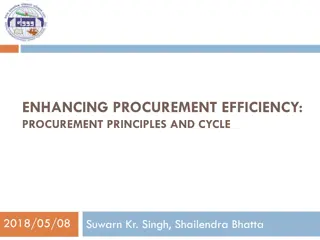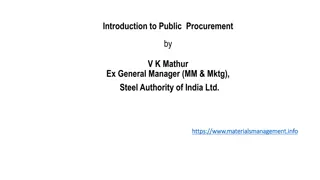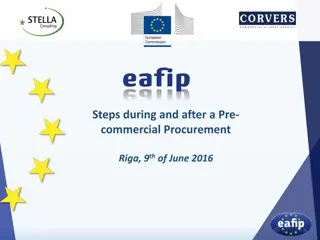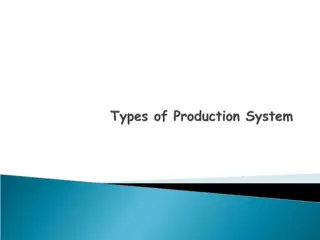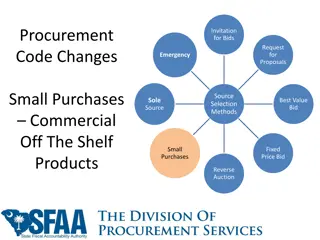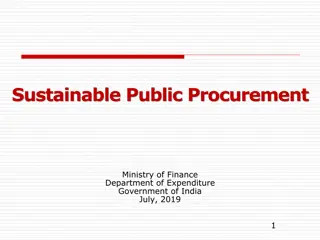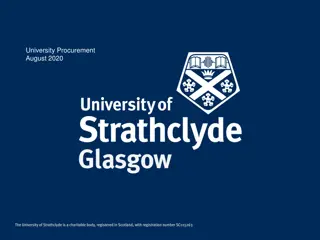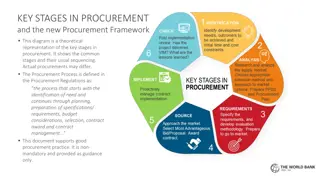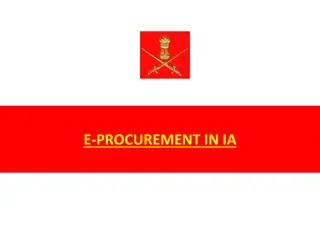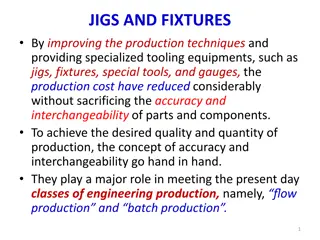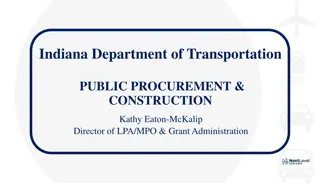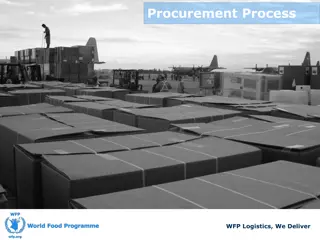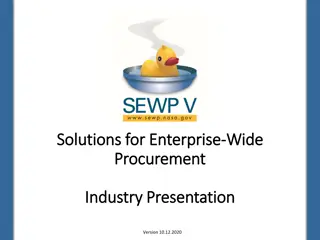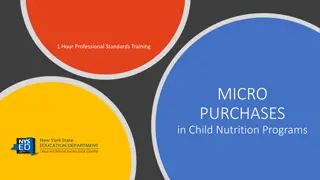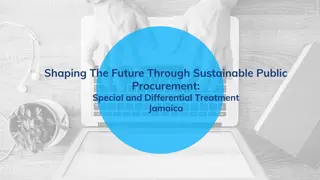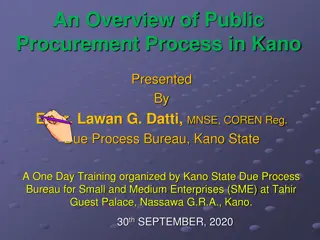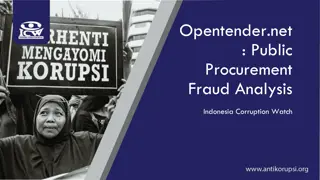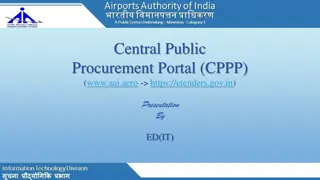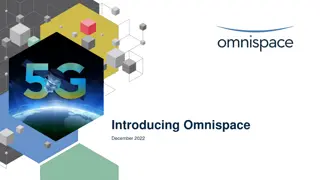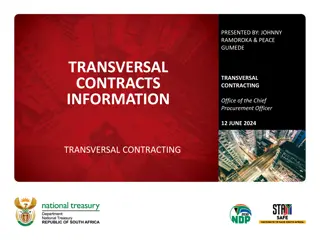Understanding Socially Responsible Public Procurement in EU Global Production Networks
Socially responsible public procurement (SRPP) acts as labor governance in global production networks by incorporating social criteria in procurement contracts within the EU. This paper aims to assess the potential of SRPP in global supply chain sectors like electronics and garments. The lack of regulations holding MNCs accountable for working conditions has led to a shift towards SRPP within the EU, aligning with evolving international norms on human rights and sustainability.
Download Presentation

Please find below an Image/Link to download the presentation.
The content on the website is provided AS IS for your information and personal use only. It may not be sold, licensed, or shared on other websites without obtaining consent from the author. Download presentation by click this link. If you encounter any issues during the download, it is possible that the publisher has removed the file from their server.
E N D
Presentation Transcript
A theoretical framework to understand socially responsible public procurement in the EU within global production networks Gale Raj-Reichert, Berlin Social Science Center Leonhard Plank, Technical University of Vienna Cornelia Staritz, University of Vienna Presentation at ILO Regulating Decent Work 2019 10 July 2019, Geneva
Socially responsible public procurement (SRPP) as labour governance in global production networks Reforms to EU Directives on public procurement can include social criteria (e.g. ILO core labour standards, Fair Trade, human rights) in procurement contracts with private firms SRPP Aim of the paper 1. understand potential of SRPP as a labour governance tool in GPNs 2. develop inter-disciplinary conceptual framework to assess its potential (economic geography, political geography, and political science) 3. assess potential of SRPP in GPNs by exploring EU s engagement in public procurement 4. Focus on electronics and garments (global supply chain sectors)
There is a lack of strong regulations holding MNCs accountable for outsourced working conditions; recent (weak) laws has shifted the discourse on labour governance of GSCs What is new and different is socially responsible public procurement within the European Union Shifting international norms on human rights and sustainability recognise the role of public procurement, e.g. UNGP, SDGs
Scale of public procurement spending Public procurement makes up: Around 16% of GDP in the EU is generated via public procurement (DG Trade, 2017) 12% of GDP amongst OECD countries (OECD website, 2018) 15-20% of global GDP (EU DG Growth website, 2018) Public contracts can be lucrative to firms: In 2012 and 2013, HP was one of the largest recipients of UK government contracts at 1.7 billion pounds
EU Directives on Public Procurement (2014/24/EU and 2014/25/EU) non-mandatory options. Each EU member state has a different composition and degree of strength in SRPP Stage in the procurement process Criteria Implication Exclude firms in violation of labour (and environmental) laws Can exclude firms from bidding and create a potential de-facto blacklist Exclude firms that propose abnormally low price that can be shown to be due to violations of labour (and environmental) laws Bidding process Contracting authorities can include performance conditions on social, the environment or labour (linked to the subject matter of the contract) Based on life-cycle costing approach; can be used to include environmental and social criteria Award criteria Most economically advantageous tender (MEAT) Can require social labels as proof of fulfilling the social characteristics. Labels criteria must be objectively-verifiably, non- discriminatory and linked to the subject matter of the contract Statescan ensure suppliers comply with a set of labour laws including the ILO CLS competent national authorities are to take appropriate action to ensure tenderers subcontractors observe social, labor or environmental laws Bidding process/award criteria/post-award Post-award/compliance during the contract Applies to suppliers in the GPN. Opens up different possibilities for ensuring compliance in the global supply chain.
Developing a theoretical framework Horner (2017) role of the state as facilitator, producer, regulator and buyer (hybrid form of regulator-buyer) In addition, theory of state power and at different scales of government A strategic-relational approach (Jessop, 2004) State policymaking as a social construction [which are] the outcomes of struggles within the state at different spatial scales and between the institutions of the state and other social formations. (Smith 2015: 298) Each scale is articulated by a different set of politics and interests
Multi-scalarity in the EU and continuum on hybridity of regulator-buyer Metascale (regulator) European Union National/Central state EU member state EU member state Germany (regulator-buyer varies) Regional German Bundesland Brandenburg German Bundesland France Bayern (regulator-buyer varies) City/municipality Berlin Paris Munich (buyer)
Meta-scale European Union (Regulator) Degrees of autonomy Steers conduct over national laws and regulations (European Council, specialized Councils, European Court of Justice) Collective representation of EU member state demands (not fully autonomous at the regulatory level)
National/Central state EU Member state, e.g. Germany EU Member state, e.g. France (regulator-buyer varies) High degree of autonomy in transposing EU Directives into national laws High autonomy in lawmaking, enforcement Devolution of power and responsibilities to sub-national scales to reduce administrative burdens and promote economic development Controls sub-national scales by steering their implementation/enforcement Develop procurement strategy, guidance material, etc. for SRPP Responds to the EU/European Court of Justice (not fully autonomous at the regulatory level)
Regional/Sub-national Bayern (German state) Brandenburg (regulator-buyer varies by EU member state) Depending on the member state, has autonomy in establishing own sub-regulations development of procurement strategy, guidance material etc.; socially responsible purchasing Varied autonomy over regional economic development and policy coordination Do not always have power over decision-making e.g. Germany, Austria and Belgium have a high degree of autonomy, while Italy and France do not
City/municipality (Buyer) Bremen Barcelona Amsterdam No autonomy over regulatory development; more autonomy over implementation Activism, e.g. Fearless Cities, Municipal Socialism in the 21st century Cities also coordinate organizational and administrative levels for capital accumulation, e.g. nodes in GPNs
Country/City/State SRPP engagement Sectors Germany Bremen Most prominent. 2016 founded a Kompetenzstelle Furniture, construction, textiles Berlin Currently reforming procurement legislation. In 2018 awarded Fairtrade Town North Rhine-Westfalia Reformed procurement law in 2018 to remove mandatory social criteria D sseldorf Dortmund, Bonn, Cologne 2017 Cologne awarded Hauptstadt des Fairen Handels ; Rahmenvertrag Dienst- und Schutzkleidung Work-clothing, electronics Schleswig-Holstein Electronics Munich Since 2016, a member of the EU Urban Agenda Partnership Netherlands Rotterdam Most prominent with ambitious Action Plan on SRPP Amsterdam, Utrecht, University of Gronigen Affiliated to Electronics Watch*** Electronics Eindhoven Electronics Sweden: Malm currently developing social clauses United Kingdom Scotland, London APUC & LUPC purchasing consortium for universities, Greater London Authority, UNISON affiliated to Electronics Watch*** Electronics Departments of Health NHS Supply Chain, NHS Scotland, Northern Ireland s Department of Health Health France: Nantes, Lourdes Nantes In 2017 implemented Responsible Purchasing Promotion Scheme Belgium, Ghent Most prominent. Member of the Global Lead City Network on Sustainable Procurement and of Procura+. 2019 EU City for Fair and Ethical Trade 2019 Finland Since 2017, Hansel (central procurement organization includes social considerations in their contracts) Electronics Sweden SKL Kommentus (central purchasing organisation for municipalities and city councils, monitoring system) Denmanrk: Kolding Clothing Spain: Barcelona, Sant Boi Affiliated to Electronics Watch*** Electronics Switzerland: Vaud
SRPP as transnational labour governance in GPNs Transnational regulatory governance Trading up (Greenhill et al., 2009; Vogel, 1995) through market access standards Power of the EU (Damro, 2012) large (public) market economic coercion regulatory capacity civil society-based institutions Contradictions and challenges Competitiveness in the EU and GPN countries trading down in GPNs/GVCs where suppliers cannot meet costly standards; race to the bottom by developing countries Austerity in the EU
Public Procurement activity in the EU (EU TED-database 2017, shows 1/3 of all tenders) Contracts by type of public buyer (in %) 100% 90% 80% 70% 60% 50% 40% 30% 20% 10% 0% EU-28 AT DE FR NL SE UK Central State (Ministry, national/federal authority) Regional/local authority Water, energy, transport and telecommunications sectors European Union institution/agency Other international organisation Body governed by public law Other National or federal Agency/Office Regional or local Agency/Office Not specified
Contract value by type of public buyer (in %) 100% 90% 80% Figure 3: Contract value by type of public buyer (2017, in %) 70% 60% 50% 40% 30% 20% 10% 0% EU-28 AT DE FR NL SE UK Central State (Ministry, national/federal authority) Regional/local authority Water, energy, transport and telecommunications sectors European Union institution/agency Other international organisation Body governed by public law Other National or federal Agency/Office Regional or local Agency/Office Not specified
Major Product categories for public buyers in the EU-28 (2017): Implications for GPNs CPV Product Name Share of Total Type of Contract in % Work Supply Service 33 Medical equipments, pharmaceuticals and personal care products 21,64 1.142 388.936 300 45 Construction work 16,29 6.818 1.978 114.310 80 Education and training services 11,2 28.638 134 48 90 Sewage-, refuse-, cleaning-, and environmental services 6,01 60.420 978 486 50 Repair and maintenance services 5,84 48.666 1.262 1.508 9 Petroleum products, fuel, electricity and other sources of energy 4,48 1.048 20.006 376 34 Transport equipment and auxiliary products to transportation 4,1 3.104 41.678 660
Top Top- -10 product categories in clothing and electronics in EU 10 product categories in clothing and electronics in EU- -28 (2017) 28 (2017) Type of Contract Total Service Supply Work Abs. % Total Clothing, Footwear & Acces. (CPV Chapter 18) 242 7964 2 8208 100 18100000 Occupational clothing, special workwear and accessories 66 2274 0 2340 29 18000000 Clothing, footwear, luggage articles and accessories 10 1170 2 1182 14 18110000 Occupational clothing 48 564 0 612 7 18143000 Protective gear 8 508 0 516 6 18130000 Special workwear 4 178 0 182 2 18830000 Protective footwear 4 168 0 172 2 Total Electronics (CPV Chapters 30+32) 4120 28764 612 33496 100 30200000 Computer equipment and supplies 108 5394 22 5524 16 30192000 Office supplies 16 1366 0 1382 4 30213000 Personal computers 14 1222 0 1236 4 30000000 Office and computing machinery, equipment and supplies 68 1098 2 1168 3 30230000 Computer-related equipment 54 1094 0 1148 3 30213100 Portable computers 4 972 0 976 3 32000000 Radio, television, communication, telecommunication 192 710 36 938 3 30190000 Various office equipment and supplies 4 854 0 858 3 30213300 Desktop computer 0 796 0 796 2 30121100 Photocopiers 268 472 2 742 2
SRPP in the EU as a labour governance tool in GPNs Type of GPN industry (product category) procured by which scale of government and EU member state matters Institutional characteristics social criteria in the tendering process regulatory institutions with transnational capacities for enforcement Influence of public/civil society organisations to hold governments/public-facing institutions to a public ethic and public duty GPN characteristics market access into a large public market stable and longer procurement contracts in duration potential to influence private governance Complexities and challenges Competing objectives: competition state, austerity, and trading down Administrative burden
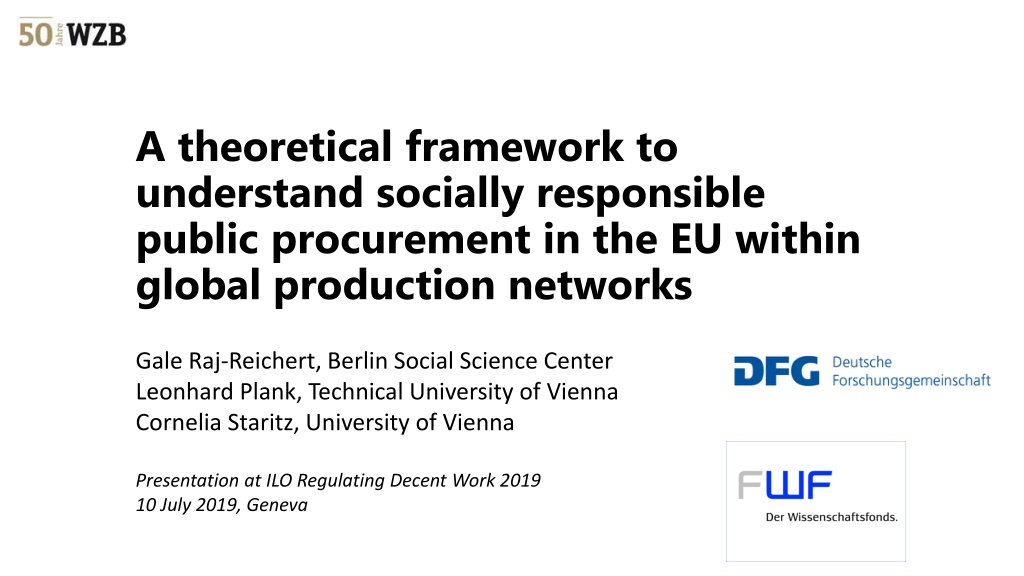

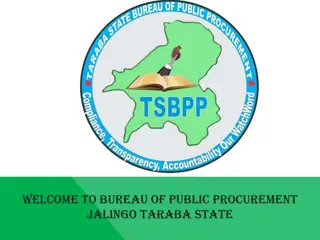
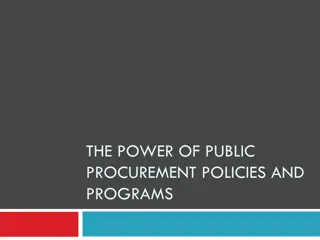

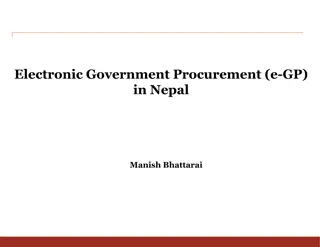
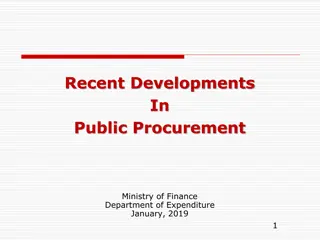

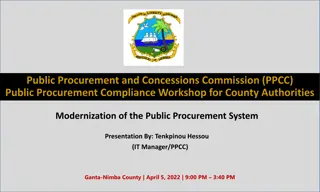
![Comprehensive Overview of Corruption Watch Submission on Public Procurement Bill [B18B-2023]](/thumb/138344/comprehensive-overview-of-corruption-watch-submission-on-public-procurement-bill-b18b-2023.jpg)
